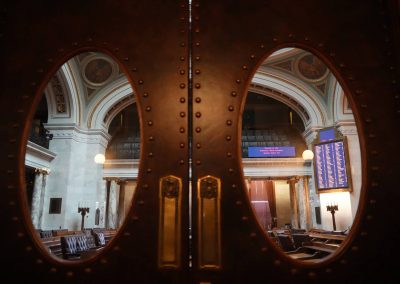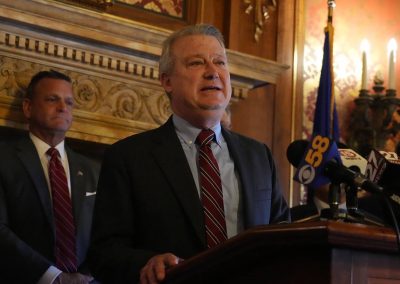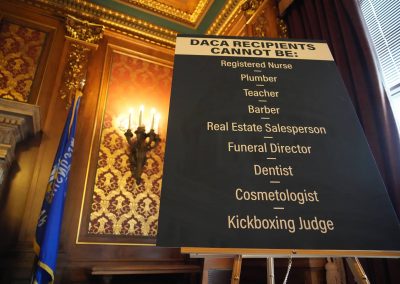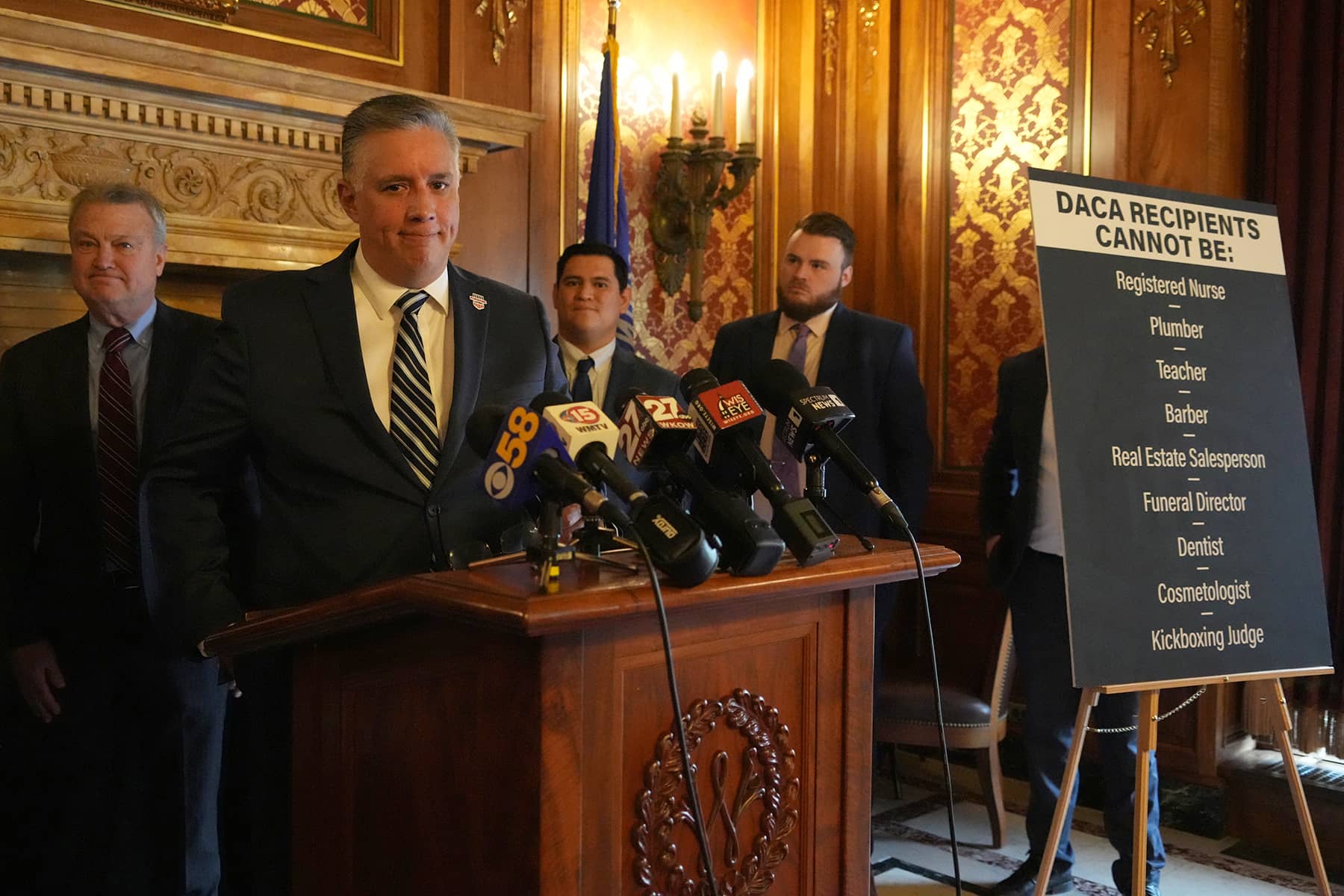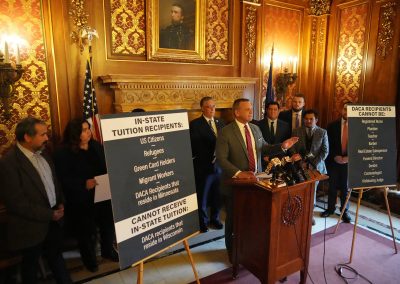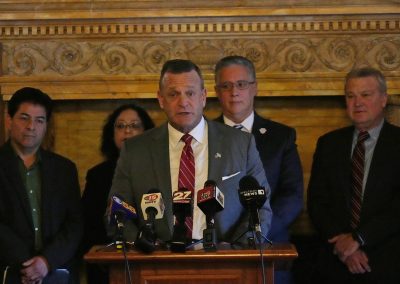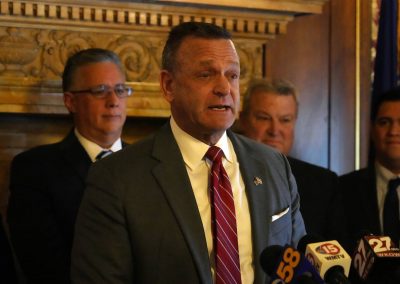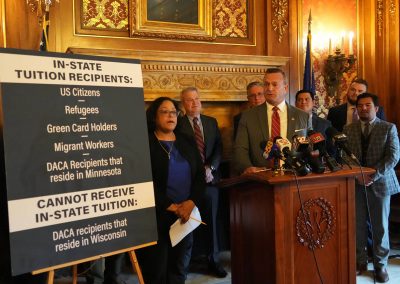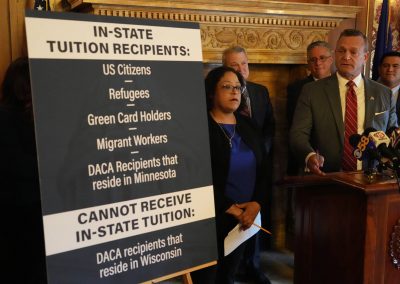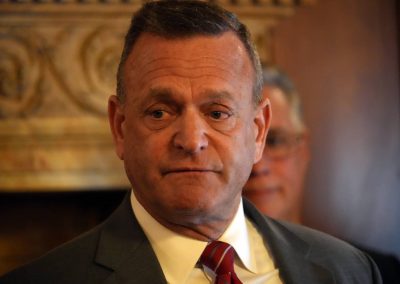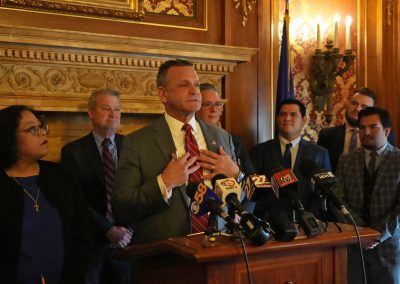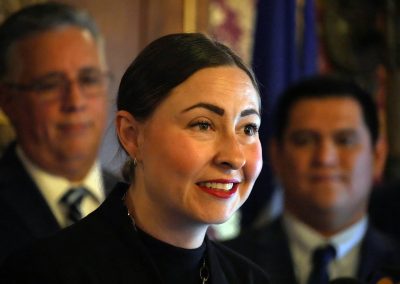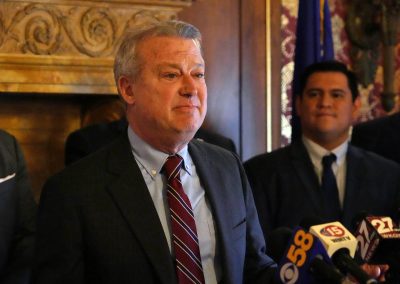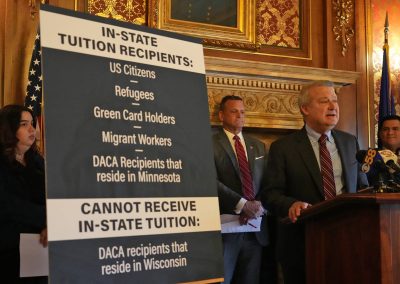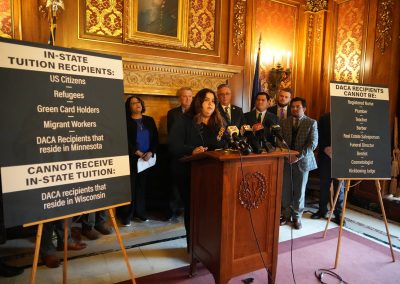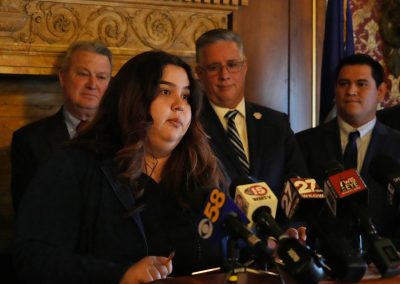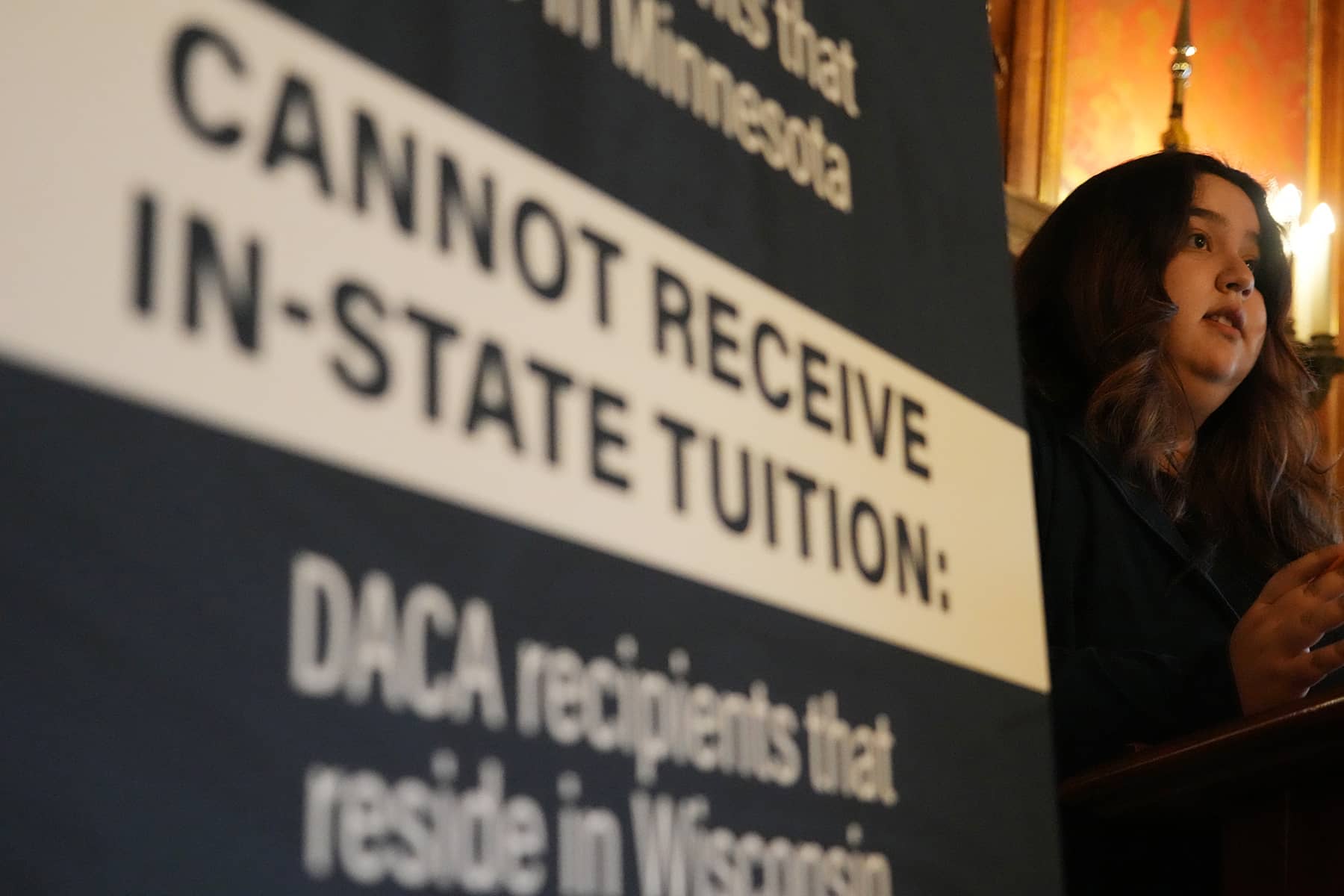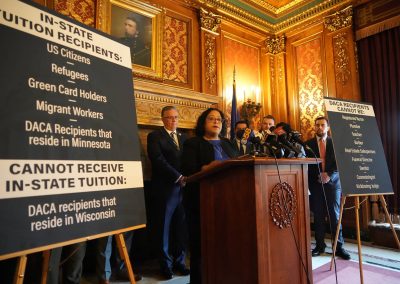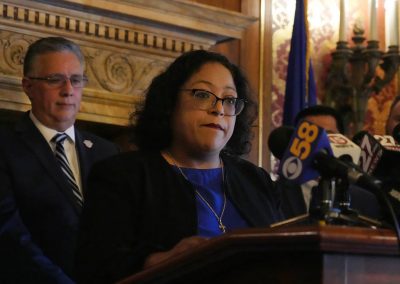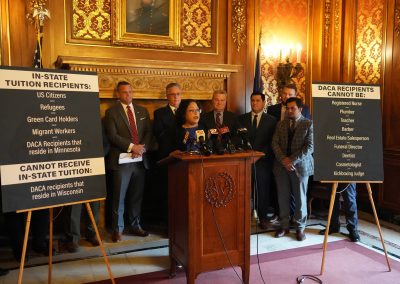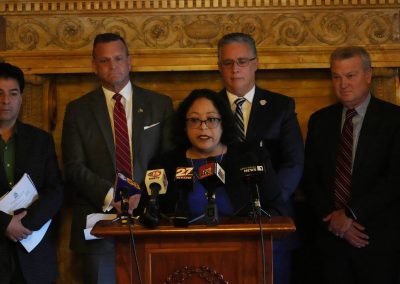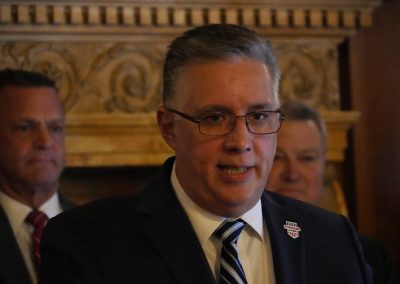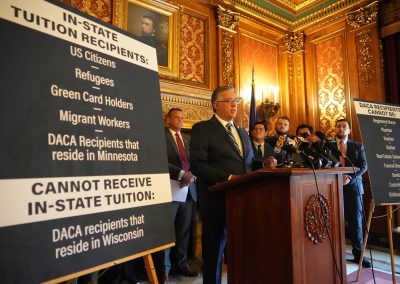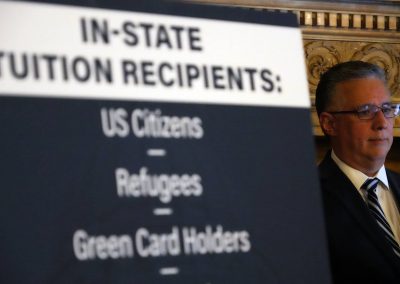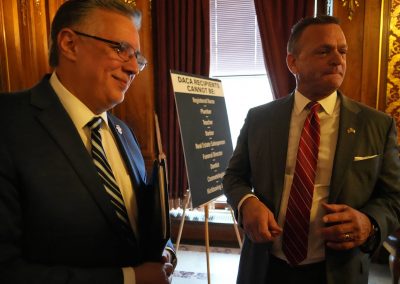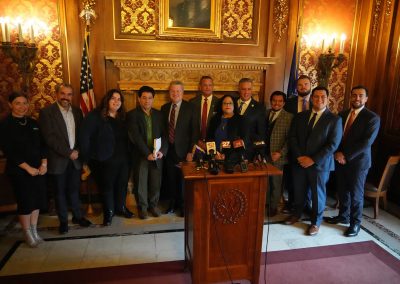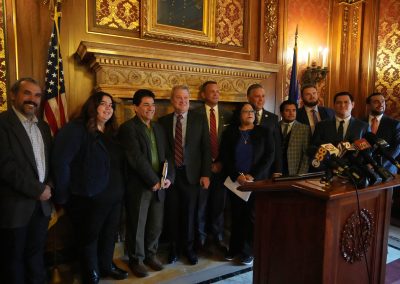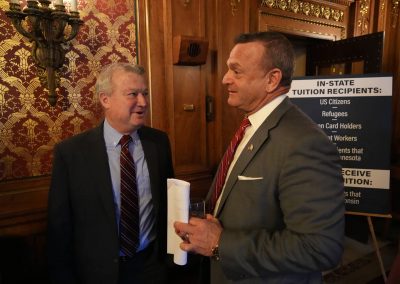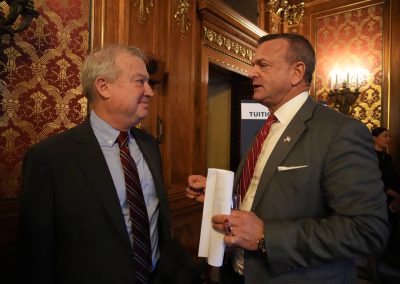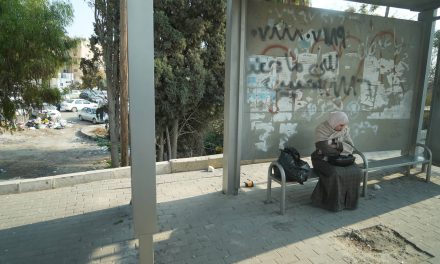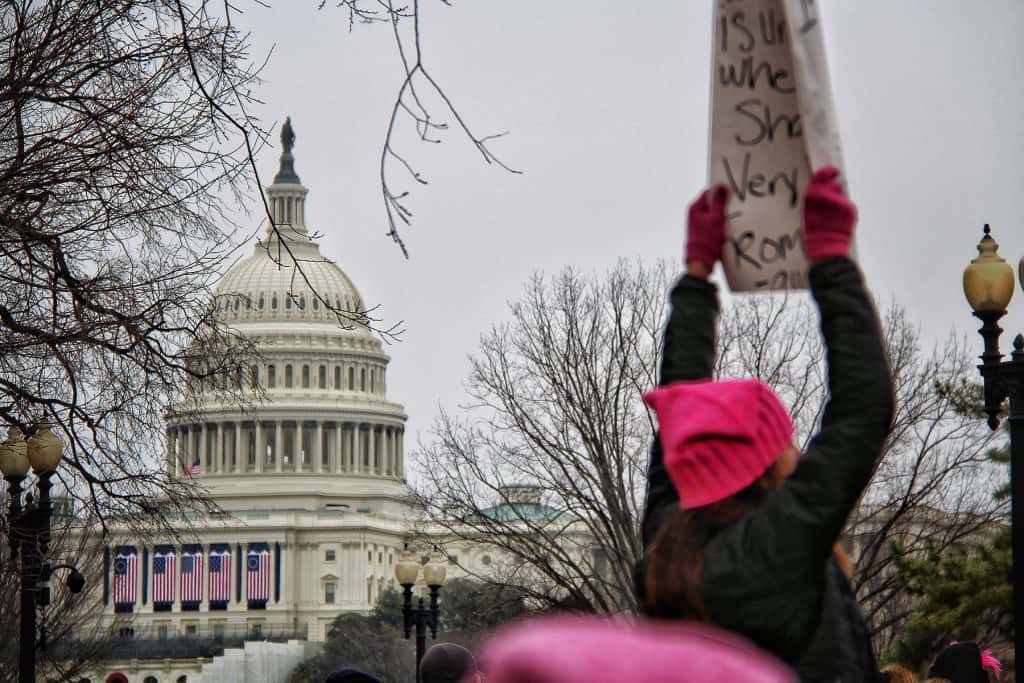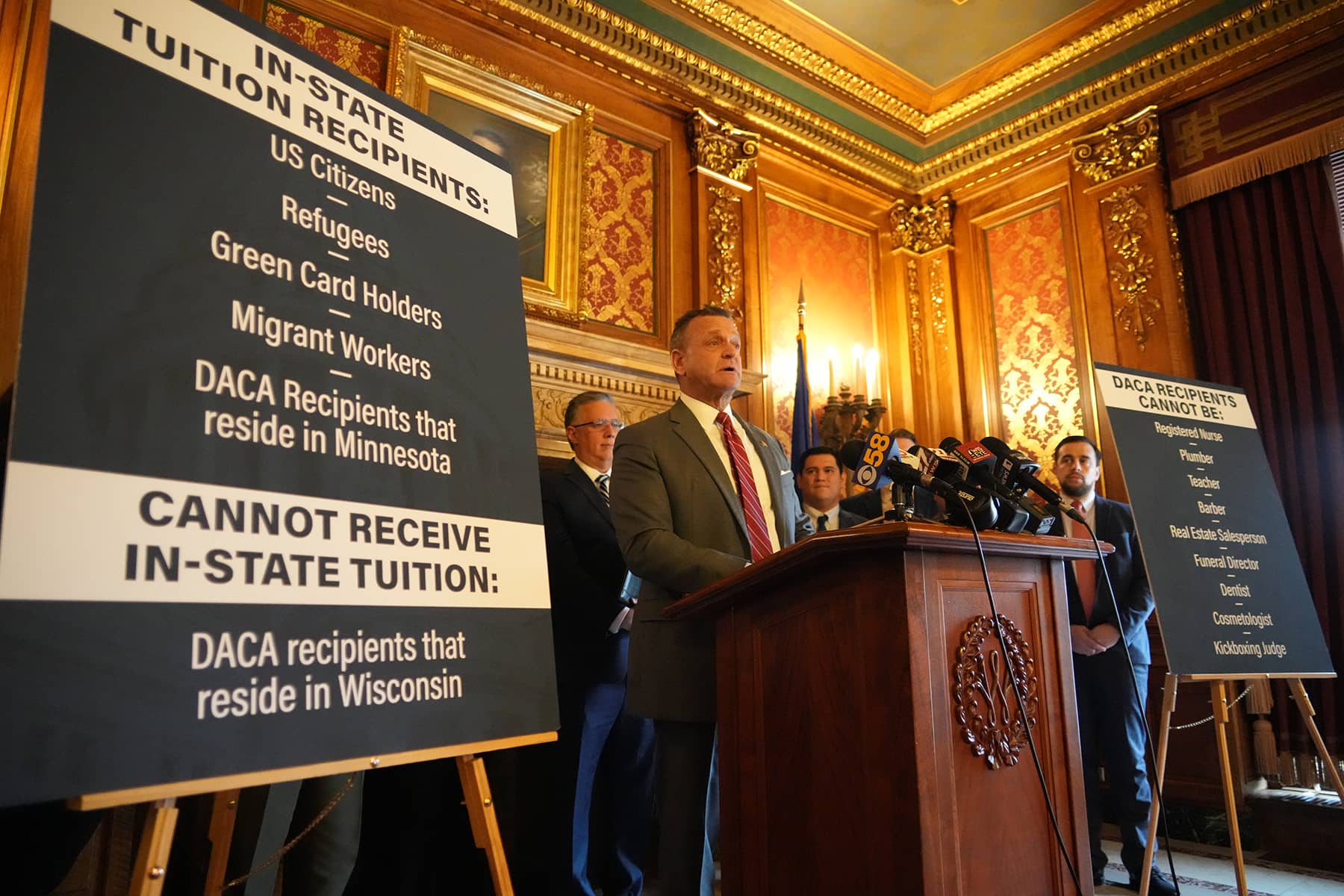
A bipartisan group of lawmakers held a press conference at the State Capitol in Madison on December 4, with the support of business and labor leaders from across the state, to introduce proposed legislation designed to help remedy Wisconsin’s workforce shortage.
Wisconsin lawmakers said that while they cannot fix the nation’s immigration policy, they can make it easier for Dreamers to work and learn in the Badger state. The three legislative bills put forward by State Representative John Macco (R-Ledgeview) could transform the lives of individuals in Wisconsin under the Deferred Action for Childhood Arrivals program, commonly known as DACA. The proposed bipartisan bills aim to address three issues, with key elements that include:
- Allowing DACA recipients to legally obtain Professional Licenses issued by the state.
- Enabling DACA recipients to qualify for in-state tuition at the UW system.
- Constructing a biennial non-refundable tax credit of $250 to help offset the $495 fee DACA recipients are required to pay every 2 years.
The Obama Administration created the DACA program through an Executive Order in 2012, and the Trump Administration terminated DACA in 2017. The program was intended to protect eligible immigrants who came to the U.S. as children from being deported. However, since they are neither U.S. citizens nor permanent residents, DACA recipients often face many major obstacles when trying to access vital services.
“Let’s be clear, there is no path to citizenship for these individuals. Congress needs to act. But in the meantime, what are we going to do about it? The DACA program has a closed group of approximately 578,000 people across the country. Currently, 5,800 of those reside here in Wisconsin,” said Representative Macco. “It’s my goal to make Wisconsin a DACA magnet across the state, and across the country.”
Under Wisconsin Assembly Bill (A.B.) 40, signed into law on June 18, 2011, the state prohibits undocumented students, including DACA recipients, from accessing in-state tuition if they wish to attend schools in the University of Wisconsin System.
The requirement to pay out-of-state tuition created an insurmountable financial barrier for some. DACA students are also ineligible for state and federal financial aid, including grants or student loans.
The policy keeps Wisconsin at an economic disadvantage. The Minnesota-Wisconsin tuition reciprocity agreement, for example, waives nonresident tuition for residents of either state who are enrolled in public institutions of higher education located in the other state. With Wisconsin’s restrictions, Wisconsin DACA recipients can attend college in Minnesota and receive all the benefits they cannot access in the UW-system.
“On average, Wisconsin DACA recipients arrived at about the age of 7 and are now beginning to start families of their own. I understand they have about 250,000 of their own children, who are now naturalized citizens. I ask you, how much control did you have over your life – and where you lived – at the age of seven?” said Representative Macco. “We’ve long held in this country that we do not hold children responsible for the crimes of their parents. DACA kids are not guilty of a crime.”
DACA recipients must submit to a biannual background check performed by Homeland Security. They must provide fingerprints, income expenses, birth records, vaccines, homework, and pay $495 for the privilege. These individuals also have driver’s licenses and social security cards. They have to sign up for the military draft, and they have work authorization.
“DACA recipients are a finite group of people in our community that fit within a very narrow criteria. DACA recipients must have been brought to the United States when they were very young children and continually resided here in the United States since 2007. It’s not a loophole for instigating illegal immigration. These people are now between 16 and 40 years old, and their average age is about 29,” said Representative Macco.
There remains a great misunderstanding when it comes to DACA recipients, Representative Macco said. DACA recipients are not getting a “free ride” in America, and “anyone who believes that is simply ignorant.” That notion is not accurate, and is often conflated or confused with issues of immigration.
DACA recipients pay taxes, but cannot vote. They cannot claim unemployment. They cannot claim student loans. They cannot claim food stamps, and they cannot claim Social Security. All those disadvantages prompted Representative Macco to propose the legislation, as a step towards a remedy. Federal law grants states the ability to allow DACA recipients access to certain opportunities that states control under their own laws.
“At the same time that Wisconsin is facing a critical workforce shortage, there are thousands of high-quality individuals who are prevented from entering high-need industries because of our state’s laws,” said Representative Macco. “DACA recipients are a finite group of driven, highly vetted individuals. I would immediately hire any DACA individual to any of my companies.”
Members of Milwaukee-based Forward Latino attended the press conference in support of the proposed legislation. Darryl Morin, National President of the non-profit advocacy organization, said that he often receives calls from business associates asking for his assistance in finding employees, or recommendations for privately funded scholarships so that DACA recipients can attend college.
“I am sure we can agree that it should be the policy of Wisconsin to develop, employ, and retain all Wisconsin talent, here in Wisconsin. Currently, that is not necessarily the case,” said Morin. “Today, we have thousands of individuals who are not able to maximize their capabilities and meaningfully participate in Wisconsin’s workforce. I speak of individuals who have lived in Wisconsin for years and are recipients of deferred action. These are individuals who are lawfully permitted to work and drive in Wisconsin.”
There are approximately 181,000 DACA students or DACA-eligible students in the U.S., accounting for less than 1 percent of all college students in the country. Because of this, DACA students living in a restrictive state like Wisconsin can expect to pay an average of $44,150 a year at public four-year schools between tuition, fees, room and board, and other college expenses — the average paid by nonresident students. Students who attend a private college will pay a lot more, an average of $55,800.
Even after successfully completing their education, these individuals face another hurdle – the inability to obtain professional licenses due to their immigration status. That not only limits their career prospects, but also affects the state’s talent pool.
Nationally, 89.5% of deferred action recipients are employed or attending school. 343,000 are employed in jobs that the U.S. Department of Homeland Security deems as essential. From health care, to education, to the supply chain and more, they are productive and contributing to the U.S. economy, and are buying homes, cars, other goods and services, in addition to paying over $9.5 billion annually in state and federal taxes.
“As a state, we cannot afford to sit on the sidelines about making investments in our labor force, only to have someone else in another state utilize that talent that we need right here in the state of Wisconsin,” said State Representative Sylvia Ortiz-Velez (D-Milwaukee). “By allowing people who are otherwise eligible to work in the United States to also work in professional licensing fields in Wisconsin, we will increase the possibilities of people being able to fill our worker shortages across industries. And by ensuring our industries and professional licensees can be filled in the future, we can secure the reliable and hardworking labor that is needed to keep Wisconsin moving forward. We are losing our labor, to other places, and we are losing our investments that we have made into people.”
The issue extends to broader economic concerns. Wisconsin, like many states, is experiencing a talent shortage in various sectors. By preventing educated and qualified DACA graduates from obtaining professional licenses, the state inadvertently exacerbates the workforce deficit.
“I am a DACA recipient from Milwaukee, studying Secondary Education at Marquette University, and I dream of becoming a middle school Spanish teacher in the Greater Milwaukee area. My hope is to act as a voice for minority students, and to give back to the communities that have played a pivotal role in helping me become the woman I am today. Unfortunately, like the dreams of hundreds of DACA recipients across the state who want to become teachers, doctors, nurses, or lawyers, my dream is continuously put on hold due to the lack of action from our state officials. I have applied myself diligently for the last 4 years to earn a teaching degree and have proven my commitment to the field of education, and yet, my capacity to fulfill this role is questioned simply because of my legal status. As I approach the end of my college journey and my student-teaching semester, I am worried about my future or ability to work within MPS, despite the evident need for teachers in our district. It’s discouraging to witness individuals, including myself, who passionately work towards their goals, and exert considerable effort to attain them, only to be denied deserving opportunities due to circumstances beyond their control. DACA recipients deserve to fulfill their dreams just as much as any American citizen. We have proven our dedication and have shown great perseverance as we put ourselves through college and professional programs, despite the lack of federal financial aid, access to in-state tuition, and the constant barriers thrown our way. There should be no reason for the state to block this initiative, as the outcome can only be positive considering the state’s dire need for workers, workers who are trained, who possess the required skills and knowledge, who have the capacity and desire to fulfill these needed and essential roles, and who can come together to maximize their talents and help Wisconsin grow. We do not want to relocate to achieve our dreams. We were raised here, we have studied here, we have struggled and persevered here, and we have formed our dreams here. We want to continue expanding our commitment to Wisconsin, promoting its economy, entering its workforce, and serving its community.” – Fátima Jiménez González, Senior at Marquette University
Representative Macco said that the bills will reach legislative committees by mid-December. They are expected to attract intense public interest from education sectors, business communities, and civil rights groups. Their passage could mark a transformative moment in Wisconsin’s approach to education, professional development, and economic growth.
“We have the ability to tear down these barriers to the benefit of all of Wisconsin,” added Morin. “Let’s allow these Wisconsinites to pay in-state tuition so they can maximize their talents and let’s allow those otherwise eligible to receive a professional license so Wisconsin can continue to attract investment and grow our business communities.”


